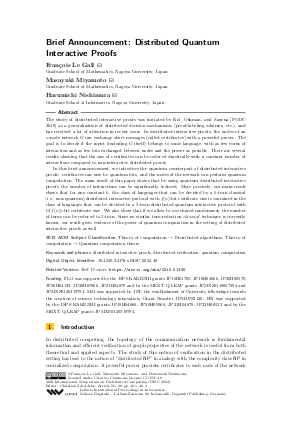Brief Announcement: Distributed Quantum Interactive Proofs
Authors François Le Gall, Masayuki Miyamoto, Harumichi Nishimura
-
Part of:
Volume:
36th International Symposium on Distributed Computing (DISC 2022)
Part of: Series: Leibniz International Proceedings in Informatics (LIPIcs)
Part of: Conference: International Symposium on Distributed Computing (DISC) - License:
 Creative Commons Attribution 4.0 International license
Creative Commons Attribution 4.0 International license
- Publication Date: 2022-10-17
File

PDF
LIPIcs.DISC.2022.48.pdf
- Filesize: 448 kB
- 3 pages
Document Identifiers
Related Versions
- Full Version https://arxiv.org/abs/2210.01390
Subject Classification
ACM Subject Classification
- Theory of computation → Distributed algorithms
- Theory of computation → Quantum computation theory
Keywords
- distributed interactive proofs
- distributed verification
- quantum computation
Metrics
- Access Statistics
-
Total Accesses (updated on a weekly basis)
0Document
0Metadata
Abstract
The study of distributed interactive proofs was initiated by Kol, Oshman, and Saxena [PODC 2018] as a generalization of distributed decision mechanisms (proof-labeling schemes, etc.), and has received a lot of attention in recent years. In distributed interactive proofs, the nodes of an n-node network G can exchange short messages (called certificates) with a powerful prover. The goal is to decide if the input (including G itself) belongs to some language, with as few turns of interaction and as few bits exchanged between nodes and the prover as possible. There are several results showing that the size of certificates can be reduced drastically with a constant number of interactions compared to non-interactive distributed proofs. In this brief announcement, we introduce the quantum counterpart of distributed interactive proofs: certificates can now be quantum bits, and the nodes of the network can perform quantum computation. The main result of this paper shows that by using quantum distributed interactive proofs, the number of interactions can be significantly reduced. More precisely, our main result shows that for any constant k, the class of languages that can be decided by a k-turn classical (i.e., non-quantum) distributed interactive protocol with f(n)-bit certificate size is contained in the class of languages that can be decided by a 5-turn distributed quantum interactive protocol with O(f(n))-bit certificate size. We also show that if we allow to use shared randomness, the number of turns can be reduced to 3-turn. Since no similar turn-reduction classical technique is currently known, our result gives evidence of the power of quantum computation in the setting of distributed interactive proofs as well.
Cite As Get BibTex
François Le Gall, Masayuki Miyamoto, and Harumichi Nishimura. Brief Announcement: Distributed Quantum Interactive Proofs. In 36th International Symposium on Distributed Computing (DISC 2022). Leibniz International Proceedings in Informatics (LIPIcs), Volume 246, pp. 48:1-48:3, Schloss Dagstuhl – Leibniz-Zentrum für Informatik (2022)
https://doi.org/10.4230/LIPIcs.DISC.2022.48
BibTex
@InProceedings{legall_et_al:LIPIcs.DISC.2022.48,
author = {Le Gall, Fran\c{c}ois and Miyamoto, Masayuki and Nishimura, Harumichi},
title = {{Brief Announcement: Distributed Quantum Interactive Proofs}},
booktitle = {36th International Symposium on Distributed Computing (DISC 2022)},
pages = {48:1--48:3},
series = {Leibniz International Proceedings in Informatics (LIPIcs)},
ISBN = {978-3-95977-255-6},
ISSN = {1868-8969},
year = {2022},
volume = {246},
editor = {Scheideler, Christian},
publisher = {Schloss Dagstuhl -- Leibniz-Zentrum f{\"u}r Informatik},
address = {Dagstuhl, Germany},
URL = {https://drops.dagstuhl.de/entities/document/10.4230/LIPIcs.DISC.2022.48},
URN = {urn:nbn:de:0030-drops-172396},
doi = {10.4230/LIPIcs.DISC.2022.48},
annote = {Keywords: distributed interactive proofs, distributed verification, quantum computation}
}
Author Details
Funding
FLG was supported by the JSPS KAKENHI grants JP16H01705, JP19H04066, JP20H00579, JP20H04139, JP20H05966, JP21H04879 and by the MEXT Q-LEAP grants JPMXS0118067394 and JPMXS0120319794. MM was supported by JST, the establishment of University fellowships towards the creation of science technology innovation, Grant Number JPMJFS2120. HN was supported by the JSPS KAKENHI grants JP19H04066, JP20H05966, JP21H04879, JP22H00522 and by the MEXT Q-LEAP grants JPMXS0120319794.
References
-
Pierluigi Crescenzi, Pierre Fraigniaud, and Ami Paz. Trade-Offs in Distributed Interactive Proofs. In Proceedings of the 33rd International Symposium on Distributed Computing (DISC 2019), pages 13:1-13:17, 2019.

-
Pierre Fraigniaud, Amos Korman, and David Peleg. Local distributed decision. In Proceedings of the IEEE 52nd Annual Symposium on Foundations of Computer Science (FOCS 2011), pages 708-717, 2011.

-
Mika Göös and Jukka Suomela. Locally checkable proofs in distributed computing. Theory of Computing, 12(1):1-33, 2016.

-
Gillat Kol, Rotem Oshman, and Raghuvansh R Saxena. Interactive distributed proofs. In Proceedings of the 2018 ACM Symposium on Principles of Distributed Computing (PODC 2018), pages 255-264, 2018.

-
Amos Korman, Shay Kutten, and David Peleg. Proof labeling schemes. Distributed Computing, 22(4):215-233, 2010.

-
Moni Naor, Merav Parter, and Eylon Yogev. The power of distributed verifiers in interactive proofs. In Proceedings of the Fourteenth Annual ACM-SIAM Symposium on Discrete Algorithms (SODA 2020), pages 1096-115, 2020.

